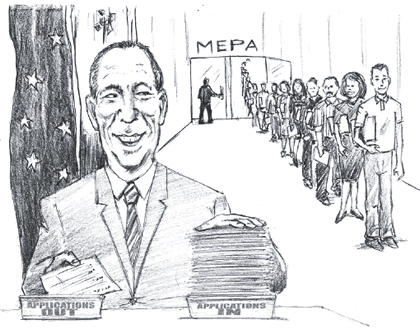
EDITORIAL | Wednesday, 09 April 2008 Negotiating the MEPA minefield
Lawrence Gonzi has certainly taken a lot on his plate, what with the absorption of the tourism portfolio within the Office of the Prime Minister, and above all his pre-electoral promise to reform the Malta Environment and Planning Authority.
This latter pledge may well have contributed in no small part to the victory of the Nationalist Party, as disgruntlement with the state of the environment was surely among the major issues affecting the 2003-2008 administration. In the four years since Dr Gonzi took over at the helm, the Nationalist Party has faced a veritable haemorrhage on account of its handling of green issues, including mass-protests over the ODZ extension in 2005 and the Xaghra l-Hamra golf course saga, among others. In the past weeks and months, the environment consistently made it into the top five public concerns in one MaltaToday survey after another. These surveys (which would later be vindicated by the election result) also consistently indicated that the prime minister himself enjoyed a high trust rating, in spite of public misgivings about the performance of some of his ministers. From this perspective, Dr Gonzi’s decision to assume responsibility for MEPA makes a good deal of political sense. Not only does it show the prime minister means business when it comes to reforming the authority; it also suggests that his government will pay more than just lip-service to the environment, which Dr Gonzi once claimed would be one of his three pillars of governance. Looked back on four years later, this claim appears at best shaky. In the last week before the election alone, MEPA’s development control commission boards (DCC) evaluated a total of 430 cases – almost three times the number of cases considered over the same period a year before. It also turns out that in 49 of these last-minute cases, the DCC boards ignored the case officers’ negative recommendations, and issued permits without any apparent justification. Dr Gonzi’s decision to tie his own credibility to his government’s environmental record is therefore a courageous move. But it is also a decision he may well live to regret, for if recent years have illustrated any change in the traditional political landscape, it is arguably in the way Nationalist voters have come to view their own party: which has now been in power almost uninterruptedly for more than 20 years. For example, one recent controversy involves a permit for a four-storey block on Transfiguration Avenue in Lija: a development which would overshadow the village's historic Belvedere, and also pave the way for wholesale village core development in an area which deserves to be protected. Speaking to MaltaToday last Sunday, Lija mayor Ian Castaldi-Paris vowed he would “leave to stone unturned" to halt the imminent development. This in itself should not come as a surprise, for it is perfectly natural for a mayor to defend the interests of his own locality. But in this case, the Castaldi-Paris is also a Nationalist mayor representing the Nationalist party; a fact which not only illustrates political maturity on his part, but should also serve as an indication of the trouble that is likely to come the prime minister's way as a result of his desperate pre-electoral gamble. Dr Gonzi is likely to find that MEPA reform is not quite as straightforward as his previous, successful overhaul of the country's finances. For one thing, the decisions involved have a direct bearing on the livelihood and interests of people across the entire spectrum of Maltese society, and as such cuts right across traditional party lines. For another, the Nationalist party has already experienced first-hand the fall-out of trying (inevitably without success) to be “all things to all people”. Dr Gonzi’s self-inflicted portfolio will now have him juggling the interests of a proverbially demanding environmentalist lobby, with the unstoppable interests of a construction lobby that the selfsame Nationalist government has in the past proved very reluctant to upset. It remains to be seen exactly how the prime minister intends to reform the planning authority, and judging by his past successes we have no doubt that Dr Gonzi will approach the matter with all the seriousness it deserves. But there is another side to the equation: for by simply annexing any troublesome department to his own portfolio, the prime minister risks taking the country back to the days when individuals by-passed all supposedly autonomous bodies, going directly to the highest authority in a bid to pre-emptively overcome all possible hurdles. As de facto MEPA chairman, Dr Gonzi may find it increasingly hard to stave off the inevitable approaches that come with the job description. He may also find that for all his good intentions, his efforts will only undermine MEPA’s autonomy and remove its original raison d’être in the first place: which was specifically to remove the onus of potentially explosive decisions from the government. It is difficult to imagine how Dr Gonzi will reform MEPA to the benefit of the environment, without grinding the economy to a halt, or undermining his own credibility. Perhaps he might wish to consider taking on board a parliamentary secretary. Or perhaps we are underestimating his talents, and he will be perfectly successful on his own. Needless to add, we will be watching him closely either way. Any comments? |
MaltaToday News Go to MaltaToday |
Managing editor Saviour Balzan | Tel. ++356 21382741 | Fax: ++356 21385075 | Email
